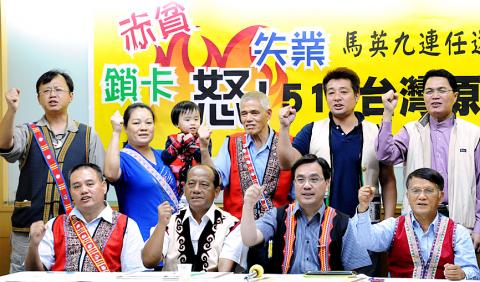Ahead of the inauguration of President Ma Ying-jeou (馬英九) for a second term on Sunday, Aborigines yesterday accused Ma of making their lives more miserable and of breaking promises he made to them during his first presidential campaign.
“No to poverty! No to unemployment! Ma Ying-jeou, apologize!” Aboriginal leaders shouted at a news conference held in Taipei, calling on 500,000 Aborigines nationwide to vent their anger at anti-Ma rallies organized by opposition parties and other civic groups this weekend.
“Ma made many beautiful promises to Taiwan’s Aborigines during his 2008 presidential campaign, vowing to make our lives better, but his promises have all been proven to be lies, as his first term as president is ending in a few days [without making good on any of the promises],” said Democratic Progressive Party (DPP) New Taipei City Councilor Icyang Parod, a member of the Amis tribe and spokesman for the Taiwan Alliance for Monitoring of Aboriginal Policies.

Photo: Chu Pei-hsiung, Taipei Times
“According to the latest figures released by the Council of -Indigenous Peoples in May last year, 58.2 percent of the country’s Aboriginal population lives under the poverty level, living on less than NT$10,000 [US$338] per month,” he said.
He said that under the former DPP government, the unemployment rate for Aborigines had been as low as 4.27 percent, but that figure had risen to 8.85 percent in September 2009, a little over a year after Ma took office.
Taxi driver Inti Osya of the Amis tribe said that rising prices had caused serious problems for him.
“It is costing me more to drive around everyday as gas prices go up, and I’m getting fewer -customers because people are less willing to take a taxi nowadays as the prices of everything are rising,” he said. “It was already difficult for us taxi drivers to make money, it is getting even harder now.”
While rising utility prices are effecting those who live in cities, it has led to more problems for Aborigines living in the mountains, said Lalin Yumin, an Atayal resident from Hsinchu County’s Wufeng Township (五峰).
“When gas prices go up, the president advises the public to take public transportation — this is a feasible solution for people in the city, but what about Aborigines who live in the mountains without public transportation,” Lalin asked. “I need to go into the mountains to work from my village. Is there any bus that I can take? When I need to deliver the fruit and vegetables that I grow to markets in the cities, the only means of transportation for me is my own truck.”
With fruit and vegetable prices staying low and gas prices going up, “we sometimes don’t make any profit at all selling high-altitude farm produce,” Lalin said.
He said many young Aborigines who cannot find work in cities decide to return to their home villages. However, they are unable to engage in traditional farming or hunting because most Aboriginal traditional domains are now national properties or reserve lands.
The activists also panned Ma for failing to fulfill his promises to grant Aborigines autonomy and to solve the issue of a de facto administrative downgrade when five former Aboriginal townships — the current Taoyuan (桃源), Maolin (茂林) and Namasiya (那瑪夏) districts in Greater Kaohsiung, Heping District (和平) in Greater Taichung and Wulai District (烏來) in New Taipei City (新北市) — became districts in special municipalities.

An essay competition jointly organized by a local writing society and a publisher affiliated with the Chinese Communist Party (CCP) might have contravened the Act Governing Relations Between the People of the Taiwan Area and the Mainland Area (臺灣地區與大陸地區人民關係條例), the Mainland Affairs Council (MAC) said on Thursday. “In this case, the partner organization is clearly an agency under the CCP’s Fujian Provincial Committee,” MAC Deputy Minister and spokesperson Liang Wen-chieh (梁文傑) said at a news briefing in Taipei. “It also involves bringing Taiwanese students to China with all-expenses-paid arrangements to attend award ceremonies and camps,” Liang said. Those two “characteristics” are typically sufficient

A magnitude 5.9 earthquake that struck about 33km off the coast of Hualien City was the "main shock" in a series of quakes in the area, with aftershocks expected over the next three days, the Central Weather Administration (CWA) said yesterday. Prior to the magnitude 5.9 quake shaking most of Taiwan at 6:53pm yesterday, six other earthquakes stronger than a magnitude of 4, starting with a magnitude 5.5 quake at 6:09pm, occurred in the area. CWA Seismological Center Director Wu Chien-fu (吳健富) confirmed that the quakes were all part of the same series and that the magnitude 5.5 temblor was

The brilliant blue waters, thick foliage and bucolic atmosphere on this seemingly idyllic archipelago deep in the Pacific Ocean belie the key role it now plays in a titanic geopolitical struggle. Palau is again on the front line as China, and the US and its allies prepare their forces in an intensifying contest for control over the Asia-Pacific region. The democratic nation of just 17,000 people hosts US-controlled airstrips and soon-to-be-completed radar installations that the US military describes as “critical” to monitoring vast swathes of water and airspace. It is also a key piece of the second island chain, a string of

The Central Weather Administration has issued a heat alert for southeastern Taiwan, warning of temperatures as high as 36°C today, while alerting some coastal areas of strong winds later in the day. Kaohsiung’s Neimen District (內門) and Pingtung County’s Neipu Township (內埔) are under an orange heat alert, which warns of temperatures as high as 36°C for three consecutive days, the CWA said, citing southwest winds. The heat would also extend to Tainan’s Nansi (楠西) and Yujing (玉井) districts, as well as Pingtung’s Gaoshu (高樹), Yanpu (鹽埔) and Majia (瑪家) townships, it said, forecasting highs of up to 36°C in those areas